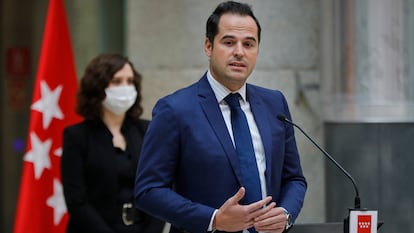Madrid considers closing regional borders ahead of long weekends
The regional government may restrict access to and from the territory in a bid to prevent contagions, but has not specified when or for how long

The Madrid government is considering putting the entire region under a perimetral lockdown, meaning citizens would not be able to enter or leave without a proper reason, such as work or a doctor’s visit. The move comes ahead of two long weekends for Madrileños: November 2 is a holiday in some regions of Spain (Madrid, Andalusia, Aragón, Asturias, Castilla y León, and Extremadura) and November 9 is a regional holiday.
But the proposal has highlighted divisions within the regional government, which is run by a center-right alliance of the Popular Party (PP) and Ciudadanos (Citizens), propped up by the far-right Vox.
Deputy premier Ignacio Aguado of Ciudadanos announced on Tuesday that he would recommend the perimetral lockdown to Madrid premier Isabel Díaz Ayuso at the government’s Cabinet meeting on Wednesday. “I am going to propose the closure [of the Madrid region] to the premier because two long weekends are coming up in the region,” he said in an interview with Spanish television network Telecinco. “There is always a lot of movement over these long weekends. I think it is important to restrict movement so that we can reach Christmas with some hope and I want the curve [of infections] to continue to fall.”
I think it is important to restrict movement so that we can reach Christmas with some hopeMadrid deputy premier Ignacio Aguado
The declaration, however, came as a surprise to sources close to PP premier Díaz Ayuso. “We didn’t know that he was going to announce it in an interview,” they said. During an event on Tuesday, Díaz Ayuso said: “The decision and the debate about the lockdown will happen between today and tomorrow morning. We have to do it with care. But the debate has to happen within the executive, not outside of it.” While Aguado said that he would be in favor of closing the region’s borders for 15 days, Díaz Ayuso refused to discuss if and when the measure may come into effect, or how long it would last.
The deputy mayor of the city of Madrid, Begoña Villacís of Ciudadanos, also supported closing the regional perimeter. “We have to be aware that we are in the middle of a second wave and the figures are terrible,” she told Spanish network Antena 3. “What’s most important is saving lives and understanding that timely actions can avoid many misfortunes in the long term.”
Sources close to the Madrid premier say the ultimate decision on whether to place the region under a perimetral lockdown will come down to the “health department and their epidemiologists.”
The decision is set to be made in the coming hours. In the meantime, 600,000 residents in Madrid already know that they will not be able to leave for the long weekend. These Madrileños live in the 32 basic healthcare areas that have been placed under a perimetral lockdown due to their high incidence rate of the virus. They can move freely within their neighborhood, but cannot leave the healthcare area, which is smaller than a city district and can include several primary healthcare centers. Residents, however, will be allowed to go to cemeteries to observe All Saints' Day on November 1, regardless of whether they are under a perimetral lockdown or if the graveyard is located in a restricted area.
Other regions close borders
Madrid is not the first region to consider closing its borders in a bid to slow the spread of the coronavirus. After the Spanish government declared a new state of alarm on Sunday, authorities in Aragón, Asturias and the Basque Country announced they would use the legal framework to close their region’s borders. The Andalusian government was also considering a similar move on Tuesday. Two other regions, Navarre and La Rioja, closed off their territory last week after seeking court authorization.
English version by Melissa Kitson.
Tu suscripción se está usando en otro dispositivo
¿Quieres añadir otro usuario a tu suscripción?
Si continúas leyendo en este dispositivo, no se podrá leer en el otro.
FlechaTu suscripción se está usando en otro dispositivo y solo puedes acceder a EL PAÍS desde un dispositivo a la vez.
Si quieres compartir tu cuenta, cambia tu suscripción a la modalidad Premium, así podrás añadir otro usuario. Cada uno accederá con su propia cuenta de email, lo que os permitirá personalizar vuestra experiencia en EL PAÍS.
¿Tienes una suscripción de empresa? Accede aquí para contratar más cuentas.
En el caso de no saber quién está usando tu cuenta, te recomendamos cambiar tu contraseña aquí.
Si decides continuar compartiendo tu cuenta, este mensaje se mostrará en tu dispositivo y en el de la otra persona que está usando tu cuenta de forma indefinida, afectando a tu experiencia de lectura. Puedes consultar aquí los términos y condiciones de la suscripción digital.









































